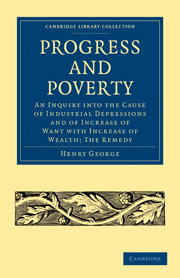 Progress and Poverty
Progress and Poverty Book contents
- Frontmatter
- PREFACE TO FOURTH EDITION
- Contents
- INTRODUCTORY
- BOOK I WAGES AND CAPITAL
- BOOK II POPULATION AND SUBSISTENCE
- BOOK III THE LAWS OF DISTRIBUTION
- BOOK IV EFFECT OF MATERIAL PROGRESS UPON THE DISTRIBUTION OF WEALTH
- BOOK V THE PROBLEM SOLVED
- BOOK VI THE REMEDY
- BOOK VII JUSTICE OF THE REMEDY
- BOOK VIII APPLICATION OF THE REMEDY
- BOOK IX EFFECTS OF THE REMEDY
- BOOK X THE LAW OF HUMAN PROGRESS
- Chapter I The current theory of human progress—its insufficiency
- Chapter II Differences in civilization—to what due
- Chapter III The law of human progress
- Chapter IV How modern civilization may decline
- Chapter V The central truth
- CONCLUSION
- INDEX
Chapter I - The current theory of human progress—its insufficiency
Published online by Cambridge University Press: 07 September 2011
- Frontmatter
- PREFACE TO FOURTH EDITION
- Contents
- INTRODUCTORY
- BOOK I WAGES AND CAPITAL
- BOOK II POPULATION AND SUBSISTENCE
- BOOK III THE LAWS OF DISTRIBUTION
- BOOK IV EFFECT OF MATERIAL PROGRESS UPON THE DISTRIBUTION OF WEALTH
- BOOK V THE PROBLEM SOLVED
- BOOK VI THE REMEDY
- BOOK VII JUSTICE OF THE REMEDY
- BOOK VIII APPLICATION OF THE REMEDY
- BOOK IX EFFECTS OF THE REMEDY
- BOOK X THE LAW OF HUMAN PROGRESS
- Chapter I The current theory of human progress—its insufficiency
- Chapter II Differences in civilization—to what due
- Chapter III The law of human progress
- Chapter IV How modern civilization may decline
- Chapter V The central truth
- CONCLUSION
- INDEX
Summary
If the conclusions at which we have arrived are correct, they will fall under a larger generalization.
Let us, therefore, recommence our inquiry from a higher standpoint, whence we may survey a wider field.
What is the law of human progress?
This is a question which, were it not for what has gone before, I should hesitate to review in the brief space I can now devote to it, as it involves, directly or indirectly, some of the very highest problems with which the human mind can engage. But it is a question which naturally comes up. Are or are not the conclusions to which we have come consistent with the great law under which human development goes on?
What is that law? We must find the answer to our question; for the current philosophy, though it clearly recognizes the existence of such a law, gives no more satisfactory account of it than the current political economy does of the persistence of want amid advancing wealth.
Let us, as far as possible, keep to the firm ground of facts. Whether man was or was not gradually developed from an animal, it is not necessary to inquire. However intimate may be the connection between questions which relate to man as we know him and questions which relate to his genesis, it is only from the former upon the latter that light can be thrown. Inference cannot proceed from the unknown to the known.
- Type
- Chapter
- Information
- Progress and PovertyAn Inquiry into the Cause of Industrial Depressions and of Increase of Want with Increase of Wealth; The Remedy, pp. 427 - 439Publisher: Cambridge University PressPrint publication year: 2009First published in: 1881
